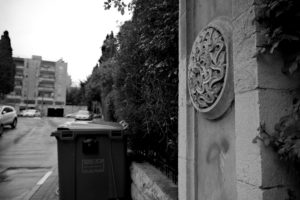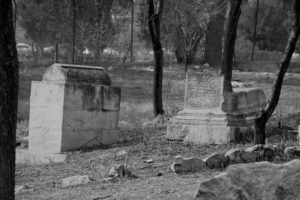JERUSALEM — My reality is that I wake up every day in a building that once belonged to Arab Palestinians (or whatever term readers would like to use for the previous owners). I had guessed at it, walking past an engraving on the road that I assumed was Ottoman. But it’s different to be told so by the woman out of whose apartment I’m renting a room for the year.
She knows her stuff. And it’s things like these that, in some way, transcend politics. Truth is an issue of politics, and which side you choose.  Whether left, right, Zionist, anti-Zionist, or washing somewhere around the hard lines and definitions of it all. The reality, though, is that I live in a building formerly owned by Arab Palestinians (according to Wikipedia, most likely Christians), in a now-Jewish neighborhood of Jerusalem that had been built also by Arab Palestinians.
Whether left, right, Zionist, anti-Zionist, or washing somewhere around the hard lines and definitions of it all. The reality, though, is that I live in a building formerly owned by Arab Palestinians (according to Wikipedia, most likely Christians), in a now-Jewish neighborhood of Jerusalem that had been built also by Arab Palestinians.
There aren’t many ways to deduce this just by looking at the place. On a Friday morning stroll down Emek Rfaim, one of the main-ish roads south of center Jerusalem, it’s all hustle and bustle. The shops, the stores, the barbers, all working away while people stock up and prepare for Shabbat. Right next to one of the express grocery stores is a metal door, above which sits an Arabic inscription in the stone and, in wrought metal above it, a moon and star. The Arabic numbers to the left of the inscription say, with some untrained and possibly unreliable Googling, 1920.
I’ve walked this street quite a lot, and haven’t found any other Arabic writing. Maybe I haven’t looked hard enough, or the rest are in an old Christian cemetery further down Emek Rfaim.
And what about politics? The experience of being on a college campus, and unwillingly debating the truths of the Israeli-Palestinian conflict, left my politics uncaring and calloused. Trying to have a conversation with people satiated on the ideology of the Boycott, Divestment, and Sanctions movement against Israel has, in large part, made me reject any narrative that paints “good guys” or “bad guys”.
My first thought on the reality I live is blunt and simple: so? So Palestinians built and lived in the home I’m now in, before being driven out or leaving (whatever your politics) in the Independence War of 1948. There are strangers living in the apartments my parents grew up in, in Belarus and Ukraine. Such is life.
My next thought begins caving in: I’ve thought about going to the apartments that my parents grew up in, to see them and to speak with the current residents. Problem is, I don’t know if I’d want to so much as look at the people who live there now. “What are you doing in my home?” might just slip off my tongue, out of the strange way that family stories are ingrained in my head, though I, of course, have never lived in those apartments a moment of my life.
And what if a Palestinian showed up at the door of the apartment in Jerusalem where I’m currently renting a room? Would they also want to say “what are you doing in my home”?
This is what I mean by truth being more negotiable than reality. We can debate the merits, failures, and successes of Israel’s War of Independence, of Zionism, of pan-Arab nationalism, of Palestinian nationalism. We can debate Yasser Arafat, Mahmoud Abbas, the Oslo Accords, Yitzhak Rabin, and Benjamin Netanyahu. We can debate the same for the Soviet Union, for Brezhnev, for Gorbachov, and for the post-Soviet leaders of Eastern Europe.
But a part of me has no interest in that conversation. A part of me only understands, and cares about, that family home that vanished in the reality of Jewish immigration from the Soviet Union. Some family members get frustrated (rightly so) with my fixation on the subject, but I no longer feel the need to explain myself even to them. It’s simply my reality.
“What are you doing in my home?”
 Closer to the center of Jerusalem, across from the Mamilla mall that leads to the Jaffa Gate of the Old City of Jerusalem, is a Muslim graveyard in extreme disrepair. And across from the graveyard is a building that, I think, is a hotel, at the top of which is beautiful Arabic writing. I, too, have graveyards in disrepair. It’s saddening…and maddening.
Closer to the center of Jerusalem, across from the Mamilla mall that leads to the Jaffa Gate of the Old City of Jerusalem, is a Muslim graveyard in extreme disrepair. And across from the graveyard is a building that, I think, is a hotel, at the top of which is beautiful Arabic writing. I, too, have graveyards in disrepair. It’s saddening…and maddening.
Here, this is the reality that Jerusalem residents wake up to. You can’t really debate it, the reality of the whole thing. But of course, even my writing about this will raise a fundamental question that, without an answer, will lead some readers to panic over the politics of another young Jew gone astray.
The answer: Yes, I’m still a Zionist. Godforsaken American conversations aside, I believe in Jewish self-determination, I believe in nation-states (call me old-fashioned), and I believe in the Jewish nation-state (I guess that makes me a fascist to some people – oh well).
But that doesn’t mean I avert my eyes from reality…

